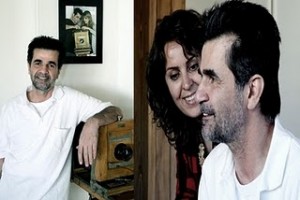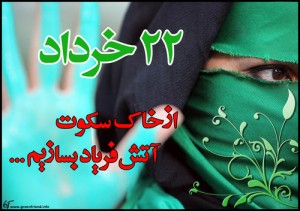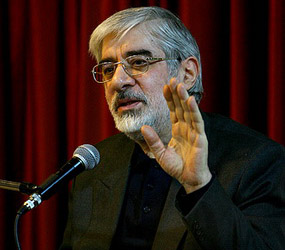
1503 GMT: Political Prisoner Watch.
Peyke Iran reports that
detainees in Evin Prison have joined student leader Majid Tavakoli (see 1425 GMT) on hunger strike.
An EA reader notifies us that a Facebook campaign for a three-day hunger strike, starting today, in sympathy with Tavakoli
has been launched.
1459 GMT: Ahmadinejad "Something's Not Right with Russia". Radio Zamaneh has extracts from the President's speech today in Kerman (see 0940 GMT), and he is
sounding more than worried about Moscow's position on nuclear issues: "“Today, explaining the actions of the Russian President [Dmitry Medvedev] to the Iranian people has become difficult. The people wonder whether they are our friends, whether they are beside us and with us or if they have other objectives.”
1455 GMT: M0usavi on Political Parties. We've posted,
in a separate entry, Mir Hossein Mousavi's comments made today to youth and student activists in Mehdi Karroubi's Etemade Melli party.
NEW Iran Document: Mousavi “On the Importance of Political Parties” (26 May)
NEW Iran Document: Karroubi “Aligning the Green Movement Inside and Outside Country”
Middle East/Iran (& Beyond) Revealed: US to Expand Covert Activities (Mazzetti)
NEW Turkey’s Diplomatic Dance: The Nuclear Two-Step Between Iran & the US (Yenidunya)
Iran Analysis: Towards the Final Battle? (Zahra)
The Latest from Iran (25 May): Panahi Freed; Will There Be a 12 June Protest?
1425 GMT: Political Prisoner Watch. Lots of internet chatter about
an interview with the mother of detained student leader Majid Tavakoli, as she calls on all Iranians abroad to help him.
Ali Tavakoli
has spoken with Human Rights Activists News Agency about his brother's condition and hunger strike and revealed that his mother is also refusing food.
1400 GMT: Mousavi, Rahnavard, and the Students. Back from an academic break to find news
Mir Hossein Mousavi and Zahra Rahnavard met student activists from Tehran's Amir Kabir University this morning to share "views and concerns". We are keeping eyes open for more details.
0940 GMT: Where's Mahmoud? (Nuclear Special Edition). President Ahmadinejad has delivered his speech in Kerman.
Press TV's article features standard rhetoric on the uranium enrichment deal, such as "[President Obama] should bear in mind that if he does not use this opportunity, Iranians are unlikely to give him a new chance....Arrogant and tyrant powers should either give up or be obliterated."
There are interesting revelations, however. Ahmadinejad tipped off his worry over Russia's position on sanctions, urging President Dmitry Medvedev to support the Iranian nuclear programme.
And Ahmadinejad actually pointed to Tehran's weakness rather than strength in the manoeuvres over uranium:
We have a reactor in Tehran which produces radio medicines. Around 800,000 people annually use radio medicines. Twenty five years ago Iran bought nuclear fuel enriched up to the level of 20 percent from Argentina for use in Tehran Research Reactor. It is currently running out of fuel.
No clue in the story whether Ahmadinejad mentioned unemployment, which is what his crowd in Khorramshahr wanted to address on Monday, or indeed any internal issue apart from uranium.
0840 GMT: We have posted an extract,
in a separate entry, from Mehdi Karroubi's interview with Rah-e-Sabz (see 0715 GMT), “Aligning the Green Movement Inside and Outside Country”.
And our colleague James Miller has written for
The Huffington Post, "A Year of Blood and Promise in Iran", using the review of events to
conclude with a look forward:
It's been a long, interesting, and tumultuous year in Iran, but the Green Movement is far from dead, or even asleep. Rather, it has been waiting for June 2010 to pounce. We'll have to wait to see who is the Caspian Tiger in Iran, the government or the people. If I were a betting man, I'd say that the next year may give us the answer.
0815 GMT: Political Prisoner Watch. RAHANA reports on
female detainees facing charges of "mohareb" (war against God), with its death sentence, including Maryam Akbari-Monfared, the mother of three children, and the youngest female prisoner, 22-year-old Parvin Javanzadeh.
0810 GMT: Economy Watch.
Fararu claims tha
t growth in 2009 was about 0.5 % --- that compares with a Government projection of 8% in its 5th Plan.
Not that this will necesarily trouble the Revolutionary Guard.
Rah-e-Sabz has another article on the millions (billions?) of dollars in oil and gas projects being picked up by the Islamic Revolution Guards Corps (see 0710 GMT).
0800 GMT: The Challenge to Ahmadinejad. Fatemeh Badaghi, the President''s legal advisor, has said that if necessary,
lawsuits will be filed against members of Parliament for criticising the Government.
Badeghi might be quite busy. Ali Larijani has easily
retained his seat as Speaker by a 214-44 vote with 32 abstentions; the suggestion of some Ahmadinejad supporters that Larijani could and should be challenged soon fizzled out.
And as the Iranian judiciary claims that it is investigating the corruption allegations against First Vice President Mohammad Reza Rahimi, MP Gholamreza Mesbahi Moghaddam
has criticised the Guardian Council blocking a law on money laundering.
0730 GMT: Where's Mahmoud? After his appearance in Khorramshahr on Monday, distinguished by heckling from the crowd over unemployment, President Ahmadinejad
is on his way to Kerman Province in central Iran.
0715 GMT: Karroubi and the Green Movement, One Year Later.
Rah-e-Sabz features
an interview with Mehdi Karroubi, with the cleric's responses to questions such as "Entering the second year of the Green Movement, where do you think you were wrong and what do you think are the strengths and successes of the movement?"
0710 GMT: Revealing the Revolutionary Guard.
Peyke Iran features an article by Jaleh Vafa claiming the devleopment of the Islamic Revolution Guards Corps into
a military and financial "mafia" over the past 30 years
0640 GMT: News of One Still Detained. Speaking of imprisoned journalists....
Tehran Prosecutor General Abbas Jafari Doulatabadi has said that Emaduddin Baghi
will be relocated in a general ward. Baghi's family have claimed that the journalist has been held in solitary confinement and in poor conditions during his 5 months behind bars.
0630 GMT: Those Who Are Not Free. Arshama3's blog, which has maintained a list of journalists in prison (
reposted on Enduring America last month),
adds two more names:
Ramin Jabbari, Blogger and Journalist,
Bayram, Nedaye Moghan, Yashil Moghan, Detained 17 May 2010
Mostafa Jamshidi, Journalist,
Redaktion Yashil Moghan, Nedaye Moghan, Detained 18 May 2010
Up to 102 journalists are still imprisoned or restricted by bail conditions.
0555 GMT: A Call for Reflection. An EA correspondent sends us the translation of
an open letter from Saeedeh Montazeri, the daughter of the late Grand Ayatollah Montazeri, to Mir Hossein Mousavi. An extract....
After your reaction to recent political executions, [Tehran Prosecutor General] Jafari Doulatabadi [said]: "How could those who claim to follow the line of Imam forget his teaching of standing up to dissident groups?....In the same years that the executions were carried out against the hypocrites by the order of Imam Khomeini (RA), Mousavi] was Prime Minister. If we consider his present claim, how did he serve then?"
Mr. Mir Hossein Mousavi! I do not intend to confirm what he [Mr. Jaafari Dowlatabadi] said, but it is fair to conclude from his words that we need to be critical according to society’s needs. Why do we all virtually have history safeguard our deeds, so that the future generation can criticize us?! This is our collective duty, to criticize our past; and if we have made any mistakes, we should attempt to compensate for it. This is especially important for politicians. Before the future generation criticizes them, politicians should attempt to criticise their deeds themselves. You must know well how this criticism can be helpful to the Green Movement.
This point must be made that the critical principle is that no one is immune from error, and our affairs should be based on this hadith that the Prophet said: "All of Adam’s children are fallible, and the best would recant."
0545 GMT: Ironic Headline of Day. Press TV writes with a straight face, "
Protesters Silenced before Queen's Speech".
0500 GMT: Tuesday's late news outside Iran was dominated by the emerging information of the release of film director Jafar Panahi on $200,000 bail. Panahi, gaunt after almost three months in detention and a reported hunger strike, was freed after a meeting last week with Tehran Prosecutor General Abbas Jafari Doulatabadi. (A question to consider: was Panahi's silence on political issues and abandonment of plans to film about the post-election situation a condition for his release?)
Because of Panahi's high profile --- and because a photograph was released to the international media --- the news was
picked up by international media. Some noted that another director, Mohammad Nourizad, had been freed a day earlier --- in fact, that news on state media has still not been confirmed (t0 our knowledge) by Nourizad's family.
The essential context was provided, however, by those who circulate news on social media.
One activist reminded, "Let's not forget the other filmmakers who was jailed with Jafar Panahi. Mohammad Ali Shirzadi is still detained at Even prison." Others put out the information that blogger Hossein Ronaghi-Maleki (Babak Khoramdin)
has been placed in solitary confinement and is the third day of a hunger strike.
And, of course, it's not directors and journalists who languish, sometimes without formal charges, sometimes in isolation, sometimes with lengthy sentences from closed trials and little known evidence, in Iran's prisons during the post-election crisis. There are doctors, lawyers, politicians, students, human rights activists, woman's rights activists, housewives....
So another day begins....
 Thursday, May 27, 2010 at 7:35
Thursday, May 27, 2010 at 7:35  As non-Iranian media were focusing on the public Tehran-Moscow dispute on Wednesday, Mir Hossein Mousavi and Mehdi Karroubi were ensuring that internal politics were not going away. Mousavi made his latest statement in a meeting with the youth and student branch of Karroubi's Etemade Melli party, and Karroubi was putting forth his views on the opposition website Rah-e-Sabz.
As non-Iranian media were focusing on the public Tehran-Moscow dispute on Wednesday, Mir Hossein Mousavi and Mehdi Karroubi were ensuring that internal politics were not going away. Mousavi made his latest statement in a meeting with the youth and student branch of Karroubi's Etemade Melli party, and Karroubi was putting forth his views on the opposition website Rah-e-Sabz.




